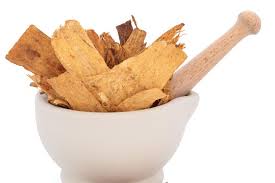|
As we enter more deeply into the Autumn season (Metal element in the Chinese Five Element System), we leave behind the bounty of summer with its long days and move into dryness and cooler weather before our rains come and days grow short and wet. Dryness, cooler air temperatures and weather changes can stress our immune system. Fall is the time to build up our Lung Qi (or vitality) to avoid catching many colds or the flu this coming winter. Luckily, our traditional Chinese Pharmacopoeia has a special adaptogenic herb that is a proven powerhouse at both giving us energy and boosting immunity. This amazing Chinese herb is known as Huang Qi, commonly also known as Astragalus/milkvetch root.
Ancient Chinese texts record the use of Huang Qi as a Qi tonic for symptoms of Spleen Qi deficiency which may manifest in the following symptoms: lethargy, diarrhea, fatigue, and lack of appetite. Huang Qi also tonifies the Lung Qi and is classically used in cases of frequent colds, spontaneous sweating, and shortness of breath. Other traditional indications include wasting disorders/diabetes, night sweats, non-healing sores, numbness and paralysis of the limbs, and edema. Current research on Huang Qi focuses on studying its chemical compounds and how they enhance the immune system or protect the heart and kidneys from oxidative damage. In general, Huang Qi increases the number of stem cells in bone marrow and encourages their development into active immune cells and lymphocytes. Specifically, studies have demonstrated Astragalus: enhances the body’s production of IgM (antibodies made by B-cells or lymphocytes) and improves the responses of lymphocytes from normal subjects and cancer patients, stimulates macrophages (mobile cells that gobble up cells infected by viruses and other debris), activates T-cells and natural killer (NK) cells (natural killer cells target tumors or damaged cells and can kill them in a few hours while sparing healthy cells), increases the anti-tumor activity of interleukin-2 (IL-2) and activates the lymphokine-activated killer (LAK) cells in cancer and AIDS patients, and enhances the effects of platinum-based chemotherapy drugs, such as cisplatin, used to combat lung cancer. Chemically speaking, Huang Qi is a powerful antioxidant. Its flavonoids, saponins, and polysaccharides help minimize free radical damage to membranes (every cell in our body has membranes). Membranes are the boundaries of every animal cell. By securing our boundaries, keeping what is precious and letting go of what we no longer need, we function optimally on a micro scale as well as a whole being. Energetically, fall can be a time to secure our boundaries, start to draw in our energies for the winter, and reflect on what is important and what we can let go of as we move with the seasons. Although Huang Qi is a very safe herb, it should be used with caution in people who take immunosuppressant drugs or lithium. Pregnant women in the 3rd trimester should limit Huang Qi as it is a mild diuretic and may decrease the amount of amniotic fluid. Used as a tonic to prevent colds and flu, it is contra-indicated for use once fever has developed. The classic Chinese herbal formula for strengthening immunity in people who frequently catch colds is called Yu Ping Feng San, or Jade Windscreen formula, and is widely available. Dried Huang Qi or Astragalus root can also be added to broths to boost the anti viral properties of your grandma’s chicken soup. For further reading: https://umm.edu/health/medical/altmed/herb/astragalus http://www.webmd.com/vitamins-supplements/ingredientmono-963-astragalus.aspx?activeingredientid=963&activeingredientname=astragalus by Julie Ginsburg, L.Ac., MS
4 Comments
2/22/2022 10:54:43 pm
Thank you for sharing informative content. It means a lot to me hope you do more articles to post.
Reply
Leave a Reply. |
Archives
December 2023
Categories
All
|
Proudly powered by Weebly


 RSS Feed
RSS Feed